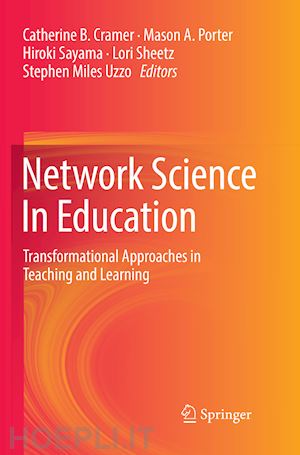
Questo prodotto usufruisce delle SPEDIZIONI GRATIS
selezionando l'opzione Corriere Veloce in fase di ordine.
Pagabile anche con Carta della cultura giovani e del merito, 18App Bonus Cultura e Carta del Docente
Around the globe, there is an increasingly urgent need to provide opportunities for learners to embrace complexity; to develop the many skills and habits of mind that are relevant to today's complex and interconnected world; and to make learning more connected to our rapidly changing workplace and society. This presents an opportunity to (1) leverage new paradigms for understanding the structure and function of teaching and learning communities, and (2) to promote new approaches to developing methods, curricular materials, and resources. Network science - the study of connectivity - can play an important role in these activities, both as an important subject in teaching and learning and as a way to develop interconnected curricula.
Since 2010, an international community of network science researchers and educators has come together to raise the global level of network literacy by applying ideas from network science to teaching and learning. Network Science in Education -which refers to both this community and to its activities - has evolved in response to the escalating activity in the field of network science and the need for people to be able to access the field through education channels.Network Science In Education: Transformational Approaches in Teaching and Learning appeals to both instructors and professionals, while offering case studies from a wide variety of activities that have been developed around the globe: the creation of entirely new courses and degree programs; tools for K-20 learners, teachers, and the general public; and in-depth analysis of selected programs. As network-based pedagogy and the community of practice continues to grow, we hope that the book's readers will join this vibrant network education community to build on these nascent ideas and help deepen the understanding of networks for all learners.
Catherine B. Cramer works at the intersection of data-driven science, learning and workforce development, specifically as it pertains to the understanding of complexity. She is currently managing industry engagement at the Columbia University Data Science Institute, working with faculty and students with a focus on applying data- driven interdisciplinary research to society’s most complex problems through innovation and collaboration with industry and government.
Mason A. Porter is a professor in the Department of Mathematics at UCLA. His research interests include a plethora of topics in complex systems, networks, nonlinear systems, and their applications. He is a Fellow of both the American Mathematical Society and the American Physical Society.
Hiroki Sayama is a Professor of Systems Science and Industrial Engineering and the Director of the Center for Collective Dynamics of Complex Systems at Binghamton University, State University of New York. His research interests include complex systems, dynamical networks, human and social dynamics, artificial life/chemistry, interactive systems, and other computer/information science related topics.
Lori Sheetz is the Director of the United States Military Academy's Center for Leadership and Diversity in STEM and a collaborator with the Network Science Center at West Point. Her research interests include effective STEM education and outreach within diverse populations traditionally underrepresented in STEM fields, bridging the STEM skills gap between standards-based curriculum and projected workplace skills, and introducing a network approach to teaching and learning to pre-college students and teachers.
Stephen Miles Uzzo is Chief Scientist for the New York Hall of Science where he does research and development of public programs and experiences on complex science and instructional development for pre-service teacher education. His background includes teaching and learning in data driven science, computer graphics systems, engineering and environmental science.











Il sito utilizza cookie ed altri strumenti di tracciamento che raccolgono informazioni dal dispositivo dell’utente. Oltre ai cookie tecnici ed analitici aggregati, strettamente necessari per il funzionamento di questo sito web, previo consenso dell’utente possono essere installati cookie di profilazione e marketing e cookie dei social media. Cliccando su “Accetto tutti i cookie” saranno attivate tutte le categorie di cookie. Per accettare solo deterninate categorie di cookie, cliccare invece su “Impostazioni cookie”. Chiudendo il banner o continuando a navigare saranno installati solo cookie tecnici. Per maggiori dettagli, consultare la Cookie Policy.